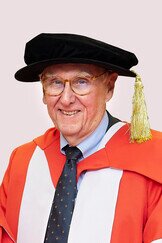

Mr Pro-Chancellor,
We continue to honour distinguished individuals who have bravely tackled the most urgent challenges of our time. Dr Jack Dangermond is a technology leader and an environmental scientist. He is a globally renowned pioneer in the development of Geographic Information Systems (GIS) that have been applied to almost every field of contemporary human activity. In Dr Dangermond’s own words, GIS is “a sort of intelligent nervous system for our planet at a time when humanity desperately needs one to address the environmental and humanitarian crises at hand.”
Dr Dangermond holds a BSc degree in Landscape Architecture from the California Polytechnic College–Pomona (1967), an MSc in Urban Planning from the Institute of Technology, University of Minnesota (1968), and an MSc in Landscape Architecture, Graduate School of Design from Harvard University (1969). He founded the Environmental Systems Research Institute (Esri) together with his wife Laura right after his graduation. Esri is a privately held business providing GIS software, education, and support to its users around the world. Today, Esri has 5,000 staff globally, 20 international research centres, and 2,700 business partners. It conducts business in 200 countries and supports more than 350,000 organisations that use its software. GIS practically has canvassed our entire world and the digital map has been a fixture in our contemporary life.
Dr Dangermond is a recipient of numerous global recognitions and medals of honour, including inter alia, the James R. Anderson, Audubon, Alexander Graham Bell, Brock, Cullum, LaGasse, Carl Mannerfelt, the Planet and Humanity Medals, and the Patron’s Medal of the Royal Geographical Society. He is an Officer in the Order of Orange Nassau, Netherlands, and has been conferred 14 honorary doctorates from universities in four countries. Dr Dangermond has devoted his entire life advocating for GIS, speaking in numerous occasions to diverse audiences around the world.
Philanthropy went hand in hand with Dr Dangermond’s entrepreneurship and advocacy. He and his wife donated US$165 million to establish the Jack and Laura Dangermond Preserve on the California coast, which was the largest gift The Nature Conservancy had ever received. This gift has helped preserve one of the last pristine stretches of California’s coast, just west of Santa Barbara. It is also worth noting that Dr Dangermond and his wife have signed The Giving Pledge.
In my communication with Dr Dangermond, he spoke of our common challenges with such passion and freshness: “As humans, we must grow and develop, but do so in a way that balances industrial and commercial advances with conservation and preservation of the natural world—people and planet are inextricably linked. If we continue to drain natural resources and disrupt ecosystems, the result will be detrimental for our species. We rely on natural places and the biodiversity they harbour. So our survival, and in turn, our economic prosperity is tied to our being good stewards of the environment.” The role of GIS is then to help rebalance this long-time imbalance that has plagued our planet. Dr Dangermond has made it very clear that he wants to deliver the technology to those who most need it, providing the software “for little or no cost to non-profit organisations, students, and responders in times of need.” Most recently, the technology was delivered to furloughed workers who were out of work due to COVID-19. Dr Dangermond’s goal has always been to make a difference, particularly in times of need.
To my usual question of what the greatest challenges of our time might be, Dr Dangermond took the opportunity to underscore environmental crises once again: “Climate change and biodiversity loss are existential threats facing our planet. There is undoubtedly a wide array of positions and opinions about those topics, but we are at a point where there are no simple solutions. What is needed are millions of decisions and actions at all levels of society and within organisations to understand, adapt, and improve the circumstances around us. In that sense we try to focus as a company on how we can move forward towards more sustainable outcomes informed by accurate data and based on rational thinking. Achieving a sustainable future will require a tremendous amount of effort from all of us. Our focus is on contributing GIS technology to those working towards positive outcomes for people and for our planet. It’s also important on a human level that we work to be kinder to one another despite these political differences, since the crises at hand are putting a different kind of stress on everyone. We must put effort into tolerance and empathy as we work through these issues.” These are all in Dr Dangermond’s own words, underscoring the urgency to build consensus across a broad range of constituents and to channel technology into a concerted effort to save our planet.
Mr Pro-Chancellor, it is my great honour and tremendous privilege to present to you Dr Jack Dangermond, for the award of Doctor of Science honoris causa.
Citation written and delivered by Professor Nicole Huang, Public Orator, the University of Hong Kong.



